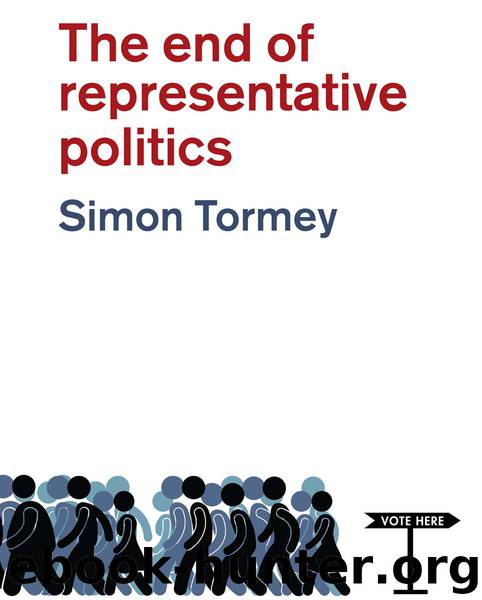The End of Representative Politics by Tormey Simon;

Author:Tormey, Simon;
Language: eng
Format: epub
Publisher: Wiley
Published: 2015-04-10T00:00:00+00:00
Notes
1. Respectively the titles of the American Political Science Association Annual Conference, 2012, and the UK Political Studies Conference, 2013.
2. http://www.bbc.co.uk/news/magazine-24079227.
3. http://ec.europa.eu/public_opinion/index_en.htm.
4. https://www.getup.org.au/.
5. http://www.avaaz.org/en/.
6. http://www.bbc.co.uk/news/uk-22007058.
4
IS THE PARTY OVER?
The rise of representative politics at the turn of the nineteenth century is marked in the emerging democracies of Europe and North America by the onset of contested elections and the creation of political parties. Political parties flourished over the course of the late nineteenth century and into the twentieth, providing a focus for political activity for committed citizens – and even the less committed. They provided a source of solidarity and support for generations of ordinary people, many of whom in turn expended time and energy in their service as activists. Parties became the object of loyalty and affection as they developed deep roots in many communities, as much social entities as political ones.
In view of the above, it’s little surprise to find that the precipitous decline in the membership of political parties in most advanced democracies elicits great soul searching amongst all species of analyst (Dalton 2002; Van Biezen 2004; Whiteley 2011). For political scientists the decline of political parties poses a problem in terms of the legitimating basis of liberal democracy. Conventional political activism takes place in and through political parties. Parties have traditionally been the main source of identification and mobilization of ordinary citizens. They have proved a useful means of aggregating or bundling up preferences and interests, in turn giving the impression of representing citizens. In a context where, for example, we see two dominant parties, like the Democrats and Republicans, the pendulum movement between the two aids the sense that parties are integral to the representation of citizens. If it’s not ‘my time’ now, then it will be at some point in the future.
For political theorists, the decline of the party as an organizational form is a worry because it suggests that we no longer wish to organize to use the power of the state for the benefit of the deserving or to advance some better vision of how we should live. This offers a diminished vision of democratic contestation, and suggests a descent into technocratic elite-driven governance as opposed to a genuine contest between distinct conceptions of justice or the Good Society (Crouch 2004; Della Porta 2013). On the left, the decline of the party is seen as indicative that politics now longer has the capacity to engage, inspire, move people to action, notwithstanding the impact of neoliberalism, the development of the surveillance state, environmental degradation. We have forsaken the big issues in favour of piecemeal reformist campaigning. Or worse: we have convinced ourselves that tapping away on Facebook or Twitter will displace ‘real’ political action, that is, action which has lasting effects and social consequences.
The decline of parties is, I think, explicable in terms of the developments we traced in the previous chapter. Politics is undergoing a transformation in terms of citizens’ ability and willingness to be represented by others, and particularly by ‘politicians’. Politics
Download
This site does not store any files on its server. We only index and link to content provided by other sites. Please contact the content providers to delete copyright contents if any and email us, we'll remove relevant links or contents immediately.
| Anarchism | Communism & Socialism |
| Conservatism & Liberalism | Democracy |
| Fascism | Libertarianism |
| Nationalism | Radicalism |
| Utopian |
The Secret History by Donna Tartt(18151)
The Social Justice Warrior Handbook by Lisa De Pasquale(11950)
Thirteen Reasons Why by Jay Asher(8447)
This Is How You Lose Her by Junot Diaz(6430)
Weapons of Math Destruction by Cathy O'Neil(5825)
Zero to One by Peter Thiel(5487)
Beartown by Fredrik Backman(5348)
The Myth of the Strong Leader by Archie Brown(5236)
The Fire Next Time by James Baldwin(5015)
How Democracies Die by Steven Levitsky & Daniel Ziblatt(4950)
Promise Me, Dad by Joe Biden(4907)
Stone's Rules by Roger Stone(4852)
100 Deadly Skills by Clint Emerson(4686)
A Higher Loyalty: Truth, Lies, and Leadership by James Comey(4546)
Rise and Kill First by Ronen Bergman(4542)
Secrecy World by Jake Bernstein(4387)
The David Icke Guide to the Global Conspiracy (and how to end it) by David Icke(4376)
The Farm by Tom Rob Smith(4320)
The Doomsday Machine by Daniel Ellsberg(4241)
